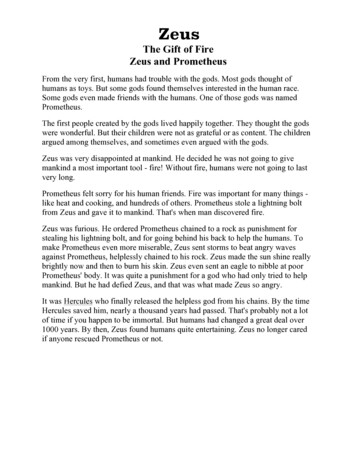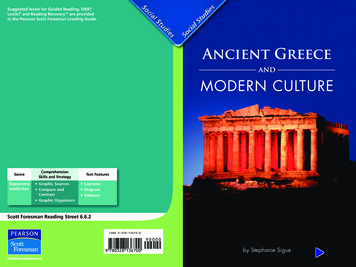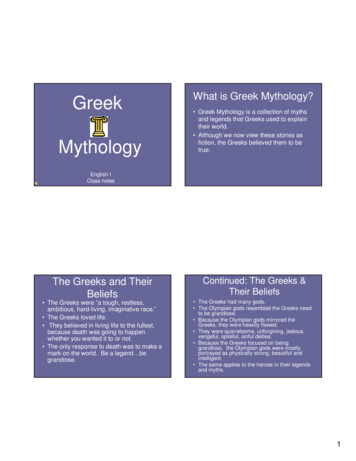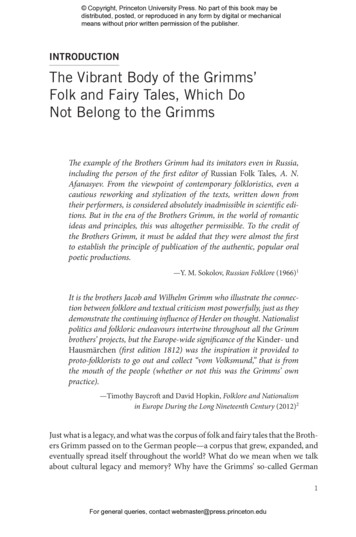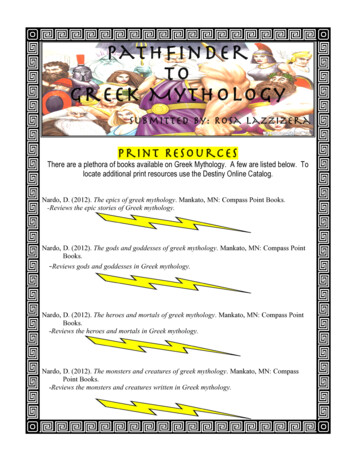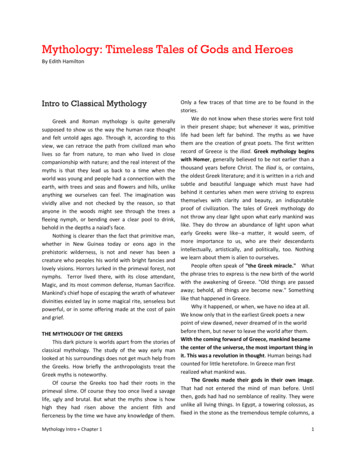
Transcription
Mythology: Timeless Tales of Gods and HeroesBy Edith HamiltonIntro to Classical MythologyGreek and Roman mythology is quite generallysupposed to show us the way the human race thoughtand felt untold ages ago. Through it, according to thisview, we can retrace the path from civilized man wholives so far from nature, to man who lived in closecompanionship with nature; and the real interest of themyths is that they lead us back to a time when theworld was young and people had a connection with theearth, with trees and seas and flowers and hills, unlikeanything we ourselves can feel. The imagination wasvividly alive and not checked by the reason, so thatanyone in the woods might see through the trees afleeing nymph, or bending over a clear pool to drink,behold in the depths a naiad's face.Nothing is clearer than the fact that primitive man,whether in New Guinea today or eons ago in theprehistoric wilderness, is not and never has been acreature who peoples his world with bright fancies andlovely visions. Horrors lurked in the primeval forest, notnymphs. Terror lived there, with its close attendant,Magic, and its most common defense, Human Sacrifice.Mankind's chief hope of escaping the wrath of whateverdivinities existed lay in some magical rite, senseless butpowerful, or in some offering made at the cost of painand grief.THE MYTHOLOGY OF THE GREEKSThis dark picture is worlds apart from the stories ofclassical mythology. The study of the way early manlooked at his surroundings does not get much help fromthe Greeks. How briefly the anthropologists treat theGreek myths is noteworthy.Of course the Greeks too had their roots in theprimeval slime. Of course they too once lived a savagelife, ugly and brutal. But what the myths show is howhigh they had risen above the ancient filth andfierceness by the time we have any knowledge of them.Mythology Intro Chapter 1Only a few traces of that time are to be found in thestories.We do not know when these stories were first toldin their present shape; but whenever it was, primitivelife had been left far behind. The myths as we havethem are the creation of great poets. The first writtenrecord of Greece is the Iliad. Greek mythology beginswith Homer, generally believed to be not earlier than athousand years before Christ. The Iliad is, or contains,the oldest Greek literature; and it is written in a rich andsubtle and beautiful language which must have hadbehind it centuries when men were striving to expressthemselves with clarity and beauty, an indisputableproof of civilization. The tales of Greek mythology donot throw any clear light upon what early mankind waslike. They do throw an abundance of light upon whatearly Greeks were like--a matter, it would seem, ofmore importance to us, who are their descendantsintellectually, artistically, and politically, too. Nothingwe learn about them is alien to ourselves.People often speak of "the Greek miracle." Whatthe phrase tries to express is the new birth of the worldwith the awakening of Greece. "Old things are passedaway; behold, all things are become new." Somethinglike that happened in Greece.Why it happened, or when, we have no idea at all.We know only that in the earliest Greek poets a newpoint of view dawned, never dreamed of in the worldbefore them, but never to leave the world after them.With the coming forward of Greece, mankind becamethe center of the universe, the most important thing init. This was a revolution in thought. Human beings hadcounted for little heretofore. In Greece man firstrealized what mankind was.The Greeks made their gods in their own image.That had not entered the mind of man before. Untilthen, gods had had no semblance of reality. They wereunlike all living things. In Egypt, a towering colossus, asfixed in the stone as the tremendous temple columns, a1
representation of the human shape deliberately madeunhuman. Or a rigid figure, a woman with a cat's headsuggesting inflexible, inhuman cruelty. Or a monstrousmysterious sphinx, aloof from all that lives. InMesopotamia, bas-reliefs of bestial shapes unlike anybeast ever known, men with birds' heads and lions withbulls' heads and both with eagles' wings, creations ofartists who were intent upon producing somethingnever seen except in their own minds, the veryconsummation of unreality.One need only place beside them in imaginationany Greek statue of a god, so normal and natural withall its beauty, to perceive what a new idea had comeinto the world. With its coming, the universe becamerational.Saint Paul said the invisible must be understood bythe visible. That was not a Hebrew idea, it was Greek. InGreece alone in the ancient world people werepreoccupied with the visible; they were finding thesatisfaction of their desires in what was actually in theworld around them. The sculptor watched the athletescontending in the games and he felt that nothing hecould imagine would be as beautiful as those strongyoung bodies. So he made his statue of Apollo. Thestoryteller found Hermes among the people he passedin the street. He saw the god "like a young man at theage when youth is loveliest," as Homer says. Greekartists and poets realized how splendid a man could be,straight and swift and strong. He was the fulfillment oftheir search for beauty. They had no wish to createsome fantasy shaped in their own minds. All the art andall the thought of Greece centered in human beings?Human gods naturally made heaven a pleasantlyfamiliar the divine inhabitants did there, what they ateand drank and where they banqueted and how theyamused themselves. Of course they were to be feared;they were very powerful and very dangerous whenangry. Still, with proper care a man could be quite fairlyat ease with them. He was even perfectly free to laughat them. Zeus, trying to hide his love affairs from hiswife and invariably shown up, was a capital figure offun. The Greeks enjoyed him and liked him all the betterfor it. Hera was that stock character of comedy, thetypical jealous wife, and her ingenious tricks todiscomfit her husband and punish her rival, far fromdispleasing the Greeks, entertained them as much asMythology Intro Chapter 1Hera's modern counterpart does us today. Such storiesmade for a friendly feeling. Laughter in the presence ofan Egyptian sphinx or an Assyrian bird-beast was inconceivable; but it was perfectly natural in Olympus,and it made the gods companionable.That is the miracle of Greek mythology--ahumanized world, men freed from the paralyzing fear lities which were worshiped elsewhere,and the fearsome spirits with which earth, air and seaswarmed, were banned from Greece. It may seem oddto say that the men who made the myths disliked theirrational and had a love for facts; but it is true, nomatter how wildly fantastic some of the stories are.Anyone who reads them with attention discovers thateven the most nonsensical take place in a world which isessentially rational and matter-of-fact. Hercules, whoselife was one long combat against preposterousmonsters, is always said to have had his home in the cityof Thebes. The exact spot where Aphrodite was born ofthe foam could be visited by any ancient tourist; it wasjust offshore from the island of Cythera. The wingedsteed Pegasus, after skimming the air all day, wentevery night to a comfortable stable in Corinth. A familiarlocal habitation gave reality to all the mythical beings. Ifthe mixture seems childish, consider how reassuringand how sensible the solid background is as comparedwith the Genie who comes from nowhere when Aladdinrubs the lamp and, his task accomplished, returns tonowhere.The terrifying irrational has no place in classicalmythology. Magic, so powerful in the world before andafter Greece, is almost nonexistent. There are no menand only two women with dreadful, supernaturalpowers. The demoniac wizards and the hideous oldwitches who haunted Europe and America, too, up toquite recent years, play no part at all in the stories. Circeand Medea are the only witches and they are young andof surpassing beauty---delightful, not horrible.Astrology, which has flourished from the days ofancient Babylon down to today, is completely absentfrom classical Greece. There are many stories about thestars, but not a trace of the idea that they influencemen's lives. Astronomy is what the Greek mind finallymade out of the stars. Not a single story has a magicalpriest who is terribly to be feared because he knows2
ways of winning over the gods or alienating them. Thepriest is rarely seen and is never of importance. In theOdyssey when a priest and a poet fall on their kneesbefore Odysseus, praying him to spare their lives, thehero kills the priest without a thought, but saves thepoet. Homer says that he felt awe to slay a man whohad been taught his divine art by the gods. Not thepriest, but the poet, had influence with heaven--and noone was ever afraid of a poet. Ghosts, too, which haveplayed so large and so fearsome a part in other lands,never appear on earth in any Greek story. The Greekswere not afraid of the dead--"the piteous dead," theOdyssey calls them.This bright picture has its dark spots. The changecame about slowly and was never quite completed. Thegods-be-come-human were for a long time a very slightimprovement upon their worshipers. They wereincomparably lovelier and more powerful, and theywere of course immortal; but they often acted in a wayno decent man or woman would. In the Iliad Hector isnobler by far than any of the heavenly beings. Herafrom first to last is a goddess on a very low level ofhumanity. Almost every one of the radiant divinitiescould act cruelly or contemptibly. A very limited senseof right and wrong prevailed in Homer's heaven, and fora long time after.Other dark spots too stand out. There are traces ofa time when there were beast-gods. The satyrs aregoat-men and the centaurs are half man, half horse.There are also stories which point back clearly to a timewhen there was human sacrifice. But what isastonishing is not that bits of savage belief were lefthere and there. The strange thing is that they are sofew.Of course the mythical monster is present in anynumber of shapes, but they are there only to give thehero his need of glory. What could a hero do in a worldwithout them? They are always overcome by him.Greek mythology is largely made up of storiesabout gods and goddesses, but it must not be read as akind of Greek Bible, an account of the Greek religion.Myths are early science, the result of men's first tryingto explain what they saw around them. But there aremany so-called myths which explain nothing at all. Thestories are early literature as well as early science.But religion is there, too. In the background, to beMythology Intro Chapter 1sure, but nevertheless plain to see. From Homerthrough the tragedians and even later, there is adeepening realization of what human beings need andwhat they must have in their gods.Zeus the Thunderer was, it seems certain, once arain-god. He was supreme even over the sun, becauserocky Greece needed rain more than sunshine and theGod of Gods would be the one who could give theprecious water of life to his worshipers. But Homer'sZeus is not a fact of nature. He is a person living in aworld where civilization has made an entry, and ofcourse he has a standard of right and wrong. It is notvery high, certainly, and seems chiefly applicable toothers, not to himself; but he does punish men who lieand break their oaths; he is angered by any ill treatmentof the dead.So, back of the stories of an amorous Zeus and acowardly Zeus and a ridiculous Zeus, we can catch sightof another Zeus coming into being, as men growcontinually more conscious of what life demanded ofthem and what human beings needed in the god theyworshiped. Gradually this Zeus displaced the others,until he occupied the whole scene.The Odyssey speaks of "the divine for which all menlong," and hundreds of years later Aristotle wrote,"Excellence, much labored for by the race of mortals."The Greeks from the earliest mythologists on had aperception of the divine and the excellent. Their longingfor them was great enough to make them never give uplaboring to see them clearly, until at last the thunderand lightning were changed into the Universal Father.Chapter One: The GodsThe Greeks did not believe that the gods createdthe universe. It was the other way about: the universecreated the gods. Before there were gods heaven andearth had been formed. They were the first parents. TheTitans were their children, and the gods were theirgrandchildren.THE TITANSThe Titans, often called the Elder Gods, were foruntold ages supreme in the universe. They were of3
enormous size and of incredible strength. There weremany of them, but only a few appear in the stories ofmythology. The most important was CRONUS, in LatinSaturn. He ruled over the other Titans until his son Zeusdethroned him and seized the power for himself. TheRomans said that when Jupiter, their name for Zeus,ascended the throne, Saturn fled to Italy and brought inthe Golden Age, a time of perfect peace and happiness,which lasted as long as he reigned.The other notable Titans were OCEAN the river thatwas supposed to encircle the earth; his wife TETHYS;HYPERION, the father of the sun, the moon and thedawn; MNEMOSYNE, which means Memory; THEMIS,usually translated by Justice; and IAPETUS, importantbecause of his sons Atlas, who bore the world on hisshoulders, and PROMETHEUS, who was the savior ofmankind. These alone among the order gods were notbanished with the coming of Zeus but they took a lowerplace.an abode of perfect blessedness. No wind, Homer says,ever-shakes the untroubled peace of Olympus; no rainever falls there or snow; but the cloudless firmamentstretches around it on all sides and the white glory ofSunshine is diffused upon its wallsThe twelve Olympians made up a divine family:(1) Zeus (JUPITER), the chief; his two brothers next,(2) POSEIDON (NEPTUNE), and (3) HADES, also calledPLUTO; (4) HESTA (VESTA). their sister; (5) HERA (JUNO),Zeus' wife, and (6) ARES (MARS), their son; Zeus'children: (7) ARES (MARS), (8) APOLLO, (9) APHRODITE(VENUS), (10) HERMES (MERCURY), and (11) ARTEMIS(DIANA); and Hera's son (12) HEPHAESTUS (Vulcan),sometimes said to be the son of Zeus too.ZEUS (JUPITER)Zeus and his brothers drew lots for their share ofthe universe. The sea fell to Poseidon, and theunderworld to Hades. Zeus became the supreme ruler.He was Lord of the Sky, the Rain-god and the Cloudgatherer, who wielded the awful thunderbolt. His powerwas greater than that of all the other divinities together.The Twelve OlympiansIn the Iliad he tells his family, "I am mightiest of all.Make trial that you may know. Fasten a rope of gold toThe twelve great Olympians were supreme amongheaven and lay hold, every god and goddess. You couldthe gods who succeeded to the Titans. They were called not drag down Zeus. But if I wished to drag you down,the Olympians because Olympus was their home. What then I would. The rope I would bind to a pinnacle ofOlympus was, however, is not easy to say. There is noOlympus and all would hang in the air, yes, the verydoubt that at first it was held to be a mountain top, and earth and the sea too.".generally identified with Greece's highest mountain, Mt.Nevertheless he was not omnipotent or omniscient,Olympus in Thessaly, in the northeast of Greece. Buteither. He could be opposed and deceived. Poseidoneven in the earliest Greek poem, the Iliad, this idea isdupes him in the Iliad and so does Hera. Sometimes,beginning to give way to the idea of an Olympus intoo, the mysterious power, Fate, is spoken of assome mysterious region far above all the mountains ofstronger than he. Homer makes Hera ask him scornfullythe earth. In one passage of the Iliad Zeus talks to theif he proposes to deliver from death a man Fate hasgods from "the topmost peak of many-ridged Olympus," doomed.clearly a mountain. But only a little further on he saysHe is represented as falling in love faith one womanthat if he wilted he could hang earth and sea from aafter another and descending to all manner of tricks topinnacle of Olympus, clearly no longer a mountain. Even hide his infidelity from his wife. The explanation whyso, it is not heaven. Homer makes Poseidon say that he such actions were ascribed to the most majestic of therules the sea, Hades the dead, Zeus the heavens, butgods is, the scholars say, that the Zeus of song and storyOlympus is common to all three.has been made by combining many gods. When hisWherever it was, the entrance to it was a great gate worship spread to a town where there was already aof clouds kept by the Seasons. Within were the gods'divine ruler the two were slowly fused into one. The lifedwellings, where they lived and slept and feasted onof the early god was then transferred to Zeus. Theambrosia and nectar and listened to Apollo's lyre. It wasMythology Intro Chapter 14
result, however, was unfortunate and the later Greeksdid not like these endless love affairs.Still, even in the earliest records Zeus had grandeur.In the Iliad Agamemnon prays: "Zeus, most glorious,most great, God of the storm-cloud, thou that dwellestin the heavens." He demanded, too, not only sacrificesfrom men, but right action. The Greek Army at Troy istold "Father Zeus never helps liars or those who breaktheir oaths." The two ideas of him, the low and the high,persisted side by side for a long time.His breastplate or shield was the aegis, awful tobehold; his bird was the eagle, his tree the oak. Hisoracle was Dodona in the land of oak trees. The gods'will was revealed by the rustling of the oak leaves whichthe priests interpreted.POSEIDON (NEPTUNE)He was the ruler of the sea, Zeus' brother andsecond only to him in eminence. The Greeks on bothsides of the Aegean were seamen and the God of theSea was all important to them. His wife was Amphitrite,a granddaughter of the Titan, Ocean. Poseidon had asplendid palace beneath the sea, but he was oftener tobe found in Olympus.Besides being Lord of the Sea he gave the firsthorse to man, and he was honored as much for the oneas for the other.But when he drove in his golden car over thewaters, the thunder of the waves sank into stillness andtranquil peace followed his smooth-rolIing wheels. Hewas commonly called "Earth-shaker" and was alwaysshown carrying his trident, a three-pronged spear, withwhich he would shake and shatter whatever he pleased.He had some connection with bulls as well as withhorses, but the bull was connected with many othergods too.HERA (JUNO)She was Zeus' wife and sister. The Titans Ocean andTethys, brought her up. She was the protector ofmarriage, and married women were her peculiar care.There is very little that is attractive in the portrait thepoets draw of her. She is called, indeed, in an earlypoem,Mythology Intro Chapter 1Golden-throned Hera, among immortals the queen.Chief among them in beauty, the glorious ladyAll the blessed in high Olympus revere,Honor even as Zeus, the lord of the thunder.But when any account of her gets down to details,it shows her chiefly engaged in punishing the manywomen Zeus fell in love with, even when they yieldedonly because he coerced or tricked them. It made nodifference to Hera how reluctant any of them were orhow innocent, the goddess treated them an alike. Herimplacable anger followed them and their children too.She never forgot an injury. The Trojan War would haveended in an honorable peace, leaving both sidesunconquered, if it had not been for her hatred of aTrojan who had judged another goddess lovelier thanshe. The wrong of her slighted beauty remained withher until Troy fell in ruins.In one important story, the Quest of the GoldenFleece, she is the gracious protector of heroes and theinspirer of heroic deeds, but not in any other.Nevertheless she was venerated in every home. She wasthe goddess married women turned to for help. Ilithyia(or Eileithyia), who helped women in childbirth, was herdaughter.The cow and the peacock were sacred to her. Argoswas her favorite city.HADES (PLUTO)He was the third brother among the Olympians,who drew for his share the underworld and the ruleover the dead. He was also called Pluto, the God ofWealth, of the precious metals hidden in the earth TheRomans as well as the Greeks called him by this name,but often they translated it into Dis, the Latin word forrich. He had a far-famed cap or helmet which madewhoever wore it invisible. It was rare that he left hisdark realm to visit Olympus or the earth, nor was heurged to do so. He was not a welcome visitor. He wasunpitying, inexorable, but just; a terrible, not an evilgod.His wife was Persephone (Proserpine) whom hecarried away from the earth and made Queen of theLower World. He was King of the Dead-not Deathhimself, whom the Greeks called Thanatos and theRomans, Orcus.5
PALLAS ATHENA (MINERVA)She was the daughter of Zeus alone. No motherbore her. Full-grown and in full armor, she sprang fromhis head. In the earliest account of her, the Iliad, she is afierce and ruthless battle-goddess, but elsewhere she iswarlike only to defend the State and the home fromoutside enemies. She was pre-eminently the Goddess ofthe City, the protector of civilized life, of handicrafts andagriculture; the inventor of the bridle, who first tamedhorses for men to use. She was Zeus' favorite child. Hetrusted her to carry the awful aegis, his buckler, and hisdevastating weapon, the thunderbolt.The word most often used to describe her is "grayeyed," or, as it is sometimes translated, "flashing-eyed."Of the three virgin goddesses she was the chief and wascalled the Maiden, Parthenos, and her temple theParthenon. In later poetry she is the embodiment ofwisdom, reason, purity. Athens was her special city; theolive created by her was her tree; the owl her bird.PHOEBUS APOLLOThe son of Zeus and Leto (Latona), born in the littleisland of Delos. He has been called "the most Greek ofall the gods". He is a beautiful figure in Greek poetry,the master musician who delights Olympus as he playson his golden lyre; the lord too of the silver bow, theArcher-god, far shooting the Healer, as well, who taughtmen the healing art. Even more than of these good andlovely endowments, he is the God of Light, in whom isno darkness at all, and so he is the God of Truth. Nofalse word ever falls from his lips.Delphi under towering Parnassus, where Apollo'soracle was, plays an important part in mythology.Castalia was its sacred spring; Cephissus its river. It washeld to be the center of the world, so many pilgrimscame to it, from foreign countries as well as Greece. Noother shrine rivaled it. The answers to the questionsasked by the anxious seekers for Truth were deliveredby a priestess who went into a trance before she spoke.The trance was supposed to be caused by a vapor risingfrom a deep cleft in the rock over which her seat wasplaced, a three legged stool, the tripod.Apollo was called Delian from Delors, the island ofhis birth, and Pythian from his killing of a serpent,Python, which once lived in the caves of Parnassus. ItMythology Intro Chapter 1was a frightful monster and the contest was severe, butin the end the god's unerring arrows won the victory.Another name often given him was "the Lycian",variously explained as meaning Wolf-god, God of Light,and God of Lycia. In the Iliad he is called "theSminthian,": the Mouse -god, but whether because heprotected mice or destroyed them no one knows. Oftenhe was the Sun-god too. His name Phoebus means"brilliant" or "shining". Accurately, however, the Sungod was Helios, child of the Titan Hyperion.Apollo at Delphi was a purely beneficent power, adirect link between gods and men, guiding men to knowthe divine will showing them how to make peace withthe gods; the purifier, too, able to cleanse even thosestained with the blood of their kindred. Nevertheless,there are a few tales told of him which show him pitilessand cruel. Two ideas were fighting in him as in all thegods: a primitive, crude idea and one that was beautifuland poetic. In him only a little of the primitive is left.The laurel was his tree. Many creatures were sacred tohim, chief among them the dolphin and the crow.ARTEMIS (DIANA)Also called Cynthia, from her birth place, MountCynthus in Delos Apollo's twin sister, daughter of Zeusand Leto. She was one of the three maiden goddesses ofOlympus: Golden Aphrodite who stirs with love allcreation, Cannot bend nor ensnare three hearts: thepure maiden Vesta, Gray-eyed Athena who cares but forwas and the arts of the craftsmen, Artemis, lover ofwoods and the wild chase over the mountain.She was the Lady of Wild Things, Huntsman-in-chiefto the gods, an odd office for a woman. Like a goodhuntsman, she was careful to preserve the young; shewas "the protectress of dewy youth" everywhere.Nevertheless, with one of those startling contradictionsso common in mythology, she kept the Greek Fleet fromsailing to Troy until they sacrificed a maiden to her. Inmany another story, too, she is fierce and revengeful.On the other hand, when women died a swift andpainless death, they were held to have been slain by hersilver arrows.As Phoebus was the Sun, she was the Moon calledPhoebe and Selene (Luna in Latin). Neither nameoriginally belonged to her. Phoebe was a Titan, one ofthe older gods. So too was Selene- a moon-goddess,6
indeed, but not connected with Apollo. She was thesister of Helios, the sun-god with whom Apollo wasconfused.In the later poets, Artemis is identified with Hecate.She is "the goddess with three forms, " Selene in thesky,Artemis on earth, Hecate in the lower world and inthe world above when it is wrapped in darkness. Hecatewas the Goddess of the dark of the Moon, the blacknights when the moon is hidden. She was associatedwith deeds of darkness, the Goddess of the Crossways,which were held to be ghostly places of evil magic.APHRODITE (VENUS)The Goddess of Love and Beauty, who beguiled all,gods and men alike; the laughter-loving goddess, wholaughed sweetly oar mockingly at those her wiles hadconquered; the resistible goddess who stole away eventhe wits of the wise. She is the daughter of Zeus andDione in the Iliad, but the later poems she is said tohave sprung from the foam of the sea, and her namewas explained as meaning "the foam risen." Aphros isfoam in Greek. This sea birth took place near Cythera,from where she was wafted to Cyprus. Both islandswere forever after sacred to her, and she was calledCytherea or the Cyprian as often as by her proper name.The Romans wrote of her in the same way. Withher, beauty comes. The winds flee before her and thestorm clouds; sweet flowers embroider the earth; thewaves of the sea laugh; she moves in radiant light.Without her there is not joy nor loveliness anywhere.This is the picture the poets like best to paint of her.But she had another side too. It was natural thatshe should cut a poor figure in the Iliad, where thebattle of heroes is the theme. She is a soft, weakcreature there, whom a mortal need not fear to attack.In later poems she is usually shown as treacherous andmalicious, exerting a deadly and destructive power overmen.In most of the stories she is the wife of Hephaestus(Vulcan), the lame and ugly god of the forge.The myrtle was her tree; the dove her birdsometimes, too, the sparrow and the swan.HERMES (MERCURY)Zeus was his father and Maia, daughter of Atlas, hismother. Because of a very popular statue hisMythology Intro Chapter 1appearance is more familiar to us than that of any othergod. He was graceful and swift of motion. On his feetwere winged sandals; wings were on his low-crownedhat, to, and on his magic wand, the Caduceus. He wasZeus' messenger, who "flies as fleet as thought to do hisbidding".Zeus made him give them back, and he wonApollo's forgiveness by presenting him with the lyrewhich he had just invented, making it out of a tortoise'sshell. Perhaps there was some connection between thatvery early story of him and the fact that he was God ofCommerce and the Market, protector of traders. In oddcontrast to this idea of him, he was also the solemnguide of the dead, the Divine Herald who led the soulsdown to their last home. He appears oftener in the talesof mythology than any other god.ARES (MARS)The God of War, son of Zeus and Hera, both ofwhom, Homer says, detested him. Indeed, he is hatefulthroughout the Iliad, poem of war though it is.Occasionally the heroes "rejoice in the delight of Ares'battle," but far oftener in having escaped the fury of theruthless god." Homer calls him murderous,bloodstained, the incarnate curse of mortals; and,strangely, a coward, too, who bellows with pain andruns away when he is wounded. Yet he has a train ofattendants on the battlefield which should inspireanyone with confidence. His sister is there, Eris, whichmeans discord, and Strife, her son. The Goddess of War,Enyo, -in Latin Bellona,- walks beside him, and with herare Terror and Trembling and Panic. As they move, thevoice of groaning arises behind them and the earthstreams with blood.The Romans liked Mars better than the Greeks likedARES. He never was to them the mean whining deity ofthe Iliad, but magnificent in shining armor, redoubtable,invincible. The warriors of the great Latin heroic poem,the Aeneid, far from rejoicing to escape from him,rejoice when they see that they are to fall "on mars'field of renown." They "rush on glorious death" and findit "sweet to die in battle."Ares figures little in mythology. In one story he isthe lover of Aphrodite and held up to the contempt ofthe Olympians by Aphrodite's husband, Hephaestus; butfor the most part he is little more than a symbol of war.7
He is not a distinct personality, like Hermes or Hera orApollo.He had no cities where he was worshipped. TheGreeks said vaguely that he came from Thrace, home ofa rude, fierce people in the northea
ways of winning over the gods or alienating them. The priest is rarely seen and is never of importance. In the Odyssey when a priest and a poet fall on their knees before Odysseus, praying him to spare their lives, the hero kills the priest without a thought, but saves the poet. Homer says that he felt awe to slay a man who

